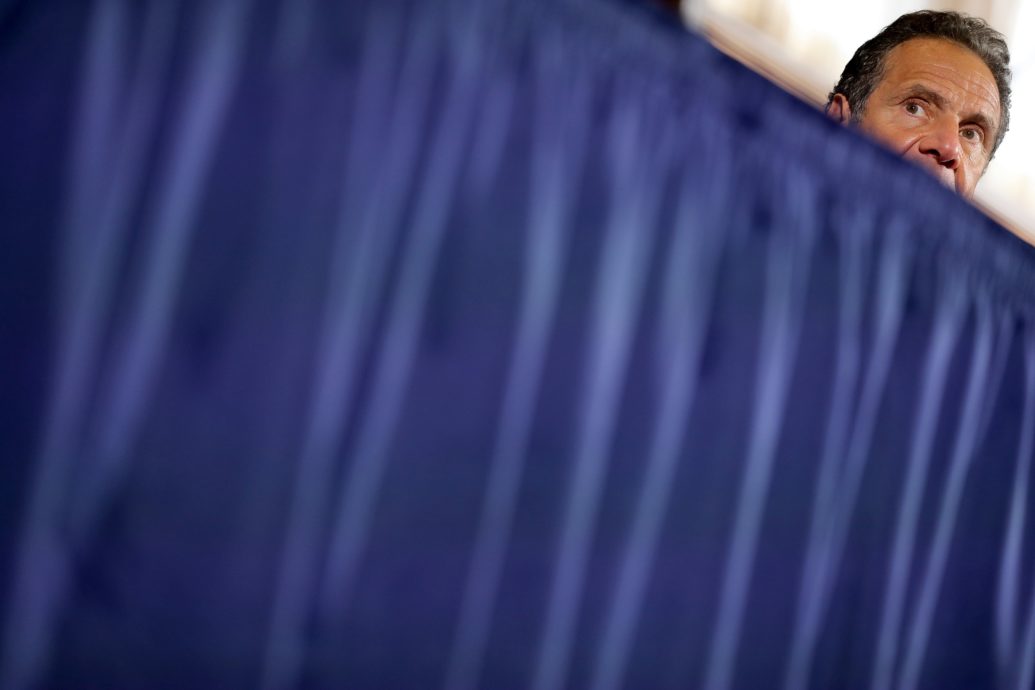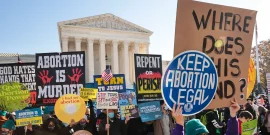On abortion, why should the preference of a majority of Americans prevail over a majority of a state's voters?
Undermining Competitive Federalism
Constitutional federalism ideally creates better government by dividing responsibilities between the states and the nation. The federal government focuses on problems of national scope while the state governments handle issues of more local concern. State officials are closer to the people than federal actors and more responsive to the diverse preferences of citizens in a continental republic. The system also creates a market for governance in which states compete with different programs and government structures. Citizens of the nation can move to those states with better prospects, promoting more responsible fiscal and regulatory decisions.
Unfortunately, our ideal structure of federalism has eroded over time, because of the unconstrained power of the federal government. The Sixteenth Amendment gave the national government much more substantial power to raise money and the Supreme Court has interpreted the Spending Clause broadly to allow Congress to spend essentially as it wishes. This structure now creates a serious problem of moral hazard for federalism. States can act irresponsibly if they can get a coalition in Congress to bail them out, and many of them are reliant on federal dollars for numerous policies. Unfortunately, the coronavirus vividly demonstrates this danger.
Warren Buffet famously said that only recessions reveal which companies are in desperate straits: when the tide goes out one learns “who is swimming naked.” The coronavirus crisis and resulting recession has likewise put a spotlight on fiscal problems of some of the most populous states in the union. Some states deliberately structured their finances so that their annual budgets only balance in good times. For instance, California depends heavily for its budget on its taxing the richest 1 percent at the highest income tax rate in the nation:13.3 percent. But this revenue stream largely depends on the very variable dividends and capital gains earned by these taxpayers, which have been radically reduced by the virus crisis. As result, the state’s huge social spending now outstrips its revenues.
My home state of Illinois runs one of the highest ratios of debts to GDP in the nation. Because of its unfunded pension obligations, its bonds were already rated the lowest in the nation. The credit agencies now threaten to downgrade the bonds to junk status making them unable to be held by many kinds of fiduciaries, making it hard for Illinois to raise money. The indiscipline of the Illinois state government likely understates the overall fiscal plight of its largest city: Chicago, which may be in worse financial shape than the state as whole.
It is true that California is threatening to furlough workers but largely as a tactic to get additional federal aid.
California and Illinois have managed their financial affairs poorly for decades. Not coincidentally, both states have some of the most unfriendly climates for business regulation that inhibit the growth that would get them out of their fiscal plights. The virus crisis is making their mistakes impossible to avoid.
And the virus not only reveals their fiscal problems but the political culture that created them. Despite the pressure on state budgets, Illinois has not furloughed any workers—even those who can’t work during the lockdown. It has permitted substantial raises for state employees to go into effect, passing up the opportunity to use the leverage of the crisis for pay relief. There is even a scandalous question of whether the legislature just voted themselves a pay increase, while trying to deny they will see extra money in their pay packets.
Illinois’s blithe attitude toward its payroll contrasts with the state’s private businesses and non-profit institutions who are looking to make ends meet. For instance, my own university has furloughed workers who cannot work remotely and has effectively cut our annual salaries five percent. Its leadership has taken much heavier pay cuts. Illinois’s inability to respond rationally to the crisis illustrates why it is in such a bad position in the first place. Public sector unions are the mainstay of the Democratic party that has controlled the state legislature for decades, their needs are always met.
It is true that California is threatening to furlough workers but largely as a tactic to get additional federal aid. The Governor has said that unless subventions are forthcoming, health workers and fire fighters will be laid off first. This threat again demonstrates how different is the behavior of its government from a business. Essential state workers are to be dismissed before taking an axe to administrative bloat.
New York Governor Andrew Cuomo has argued that states like his should get more aid, because it is one of the states that pays more into the federal budget than it gets out. But there are both well and badly managed states on that list. The ratio of funds it gets back has nothing to do with California’s decision to rely on the most variable kind of tax revenues to balance its budgets. Budget crises in states are ultimately ones of political culture.
And in any event the overwhelming reason that citizens from New York, California and Illinois pay more to the federal government is that these states have a disproportionate number of very rich people. The federal government has the power under the Sixteenth Amendment to levy an income tax and we have decided to have a highly progressive one. It has nothing to do with geography. If Cuomo would like to argue for a lower rate, I would welcome his support.
California and Illinois want to use the crisis to get the federal government to bail them out. And the House of Representatives is all too happy to oblige, in part because members of the Democratic majority come more from states like Illinois and California than more prudently managed states like Florida and Utah, and in part because they have an ideological interest in incentivizing states to spend more.
Thus, a recently passed House bill makes available 500 billion dollars to states in federal aid. It makes this aid “flexible” and does not try to distinguish between extraordinary losses caused by coronavirus and the losses occasioned by the states ongoing bad fiscal and regulatory policies.
To dispel any doubt that a goal of the House bill is to federalize the costs of large and irresponsible state governments, the bill also suspends the cap on state and local tax deductions. Permitting such an unlimited federal tax deduction allows high-tax states to pass a substantial amount of their spending to citizens in other states and makes it easier to raise state taxes. The unlimited deduction is also largely a boon to wealthy individuals, showing that the progressive desire to soak the rich takes a backseat to helping high spending states.
To be sure, the virus does not stop at state borders, and the federal government should take action that helps all states to combat its consequences. The Federal Reserve for instance has cut interest rates, which help businesses get loans to tide themselves over. It injected substantial liquidity so that the financial system did not collapse.
Congress has also rightly made it easier to collect unemployment for workers, most of who are losing their jobs at least temporarily through no fault of their own. (Unfortunately, however, Congress raised employments benefits so high that it is deterring some from going back to work.) And in my view Congress should provide even more federal money for encouraging tests, cures, and contact testing and supporting those quarantined. Stopping the pandemic is a national priority.
But it is essential for our federalism that the national government refrain from paying for the past and present fiscal mismanagement by state governments. Such action is unfair to citizens of states that have acted prudently. Even worse, it will also encourage many states with bad political cultures, like California and Illinois, to act even more imprudently in the future than they do today. The coronavirus will not be the last national crisis in which progressive coalitions try to use a crisis to weaken our market for better state governance.



